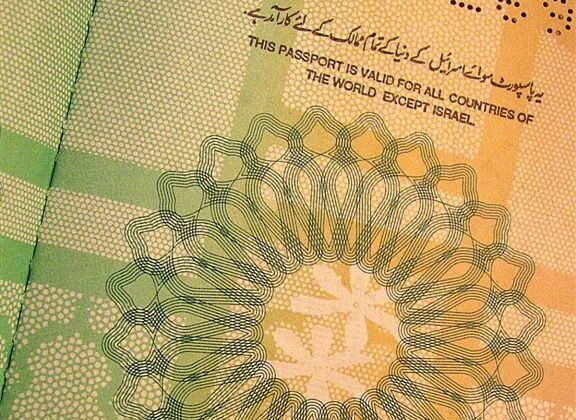
At the recent World Economic Forum in Davos, Switzerland, Israeli President Isaac Herzog’s remarks about his positive experience meeting a group of Pakistani-Americans created political uproar in Pakistan. After his revelations, state broadcaster Pakistan Television fired Pakistani journalist Ahmed Qureshi, who was part of the visiting delegation to Israel. In response, the Pakistani Senate passed a resolution on May 30 condemning Israeli atrocities against the Palestinians and urged the Pakistani government to highlight the Palestinian issue globally. However, the resolution notably stopped short of asking the government to desist from recognizing Israel.
The controversy within Pakistan comes at the heels of U.S. President Biden’s planned trip to the Middle East in mid-July, where Saudi Arabia and Israel are expected to reach an agreement to hand over two Red Sea islands from Tel Aviv to Riyadh. Since Pakistan is resetting ties with the United States and has a cordial relationship with Saudi Arabia, a strengthened diplomatic relationship between Israel and Saudi Arabia will also bring into sharp focus the question of Pakistan’s potential recognition of Israel. The debate of recognizing and establishing diplomatic relations with Israel has intermittently surfaced in Pakistan, often drawing domestic criticism. As countries in the Middle East move towards restoring ties with Israel, Pakistan will not be able to shy away from this question for long. Renewed domestic focus in Pakistan on Israel coupled with a rapidly transforming geopolitical climate in the Middle East allows Pakistan the opportunity to consider setting up a relationship with Israel.
How Pakistan Currently Views Israel
Over the years, Pakistan’s principle stance of not recognizing Israel until Palestinians achieve a peaceful end to the conflict and get an independent state has done little to advance the Palestinian cause. While Pakistan’s continuous denial of recognizing Israel lends moral support to advancing Palestinian statehood – especially as the sole atomic power in the Islamic world – the policy has not brought positive results for Palestine or Pakistan. However, while the debate of forging diplomatic relations with Israel is no longer considered taboo in Pakistan, Pakistani perceptions of Israel are still overwhelmingly negative.
Renewed domestic focus in Pakistan on Israel coupled with a rapidly transforming geopolitical climate in the Middle East allows Pakistan the opportunity to consider setting up a relationship with Israel.
Additionally, Islamabad’s support for the Palestine conflict favoring a two-state resolution is identical to its stance on Kashmir, maintaining Kashmiris’ right to self-determination according to previous UN resolutions. If Pakistan recognizes Israel, it will compromise its position on Kashmir, which Pakistani leaders have repeatedly emphasized as an analogous situation to the one in Palestine. Pakistan also fears a backlash from Kashmiri leadership, who have insisted that recognizing Israel constitutes “abandoning” the Kashmiri cause. This situation leaves little space for any democratically elected Pakistani government to take a bold stance on Israel, let alone extend recognition. Hence, it is unsurprising that Pakistan’s official perspective of not recognizing Israel without a two-state solution to the conflict within the pre-1967 borders has not changed.
Pakistan’s Motivations for Recognizing Israel
As countries in the Gulf have started normalizing their relationships with Israel, Pakistan has the chance to revisit its own policy. Recognition from countries like Bahrain, the UAE, and Morocco, and Saudi Arabia’s expansion of secretive talks with Israel could provide more impetus for Islamabad to present its case of Israeli recognition to a skeptical domestic audience.
In the long-term, if Pakistan becomes more isolated in its position on Israel, it could also alter its historically warm ties with Gulf states moving towards recognition, like Saudi Arabia and the UAE. As important economic partners and home for many in Pakistan’s diaspora and migrant worker population, these countries have more leverage to push Pakistan towards recognition or make the regional environment less welcoming to Pakistani workers.
Through extending recognition, Pakistan can also benefit from Israel’s state-of-the-art military hardware, such as attack helicopters, which Pakistan needs for its counterterrorism operations in Balochistan and its northwestern regions bordering Afghanistan. Since the U.S.’s reluctance to sell military hardware to Pakistan and the inferior quality of Chinese defense equipment, Islamabad has been looking for new defense partners to maintain rough conventional parity with India. Israel, as a growing defense exporter, could fulfill some of Pakistan’s defense requirements.

By engaging with Israel, Pakistan can also learn and adopt Tel Aviv’s innovative water technology to overcome its water deficiency and meet the soaring requirements of its ever-growing population. Israel is the world leader in water recycling; it recycles nearly 90 percent of its water, about four times more than any other country globally. Pakistan is among the top 10 countries facing water scarcity, and the South Asian nation will require innovative water technologies in the next 10 to 15 years. Similarly, Israel has among the world’s best start-up sectors and will have a lot to offer to Pakistan’s budding and promising start-up industry.
Some have argued that there is no harm in recognizing Israel if it resolves the Palestine issue, which could assist Islamabad in getting diplomatic support at international forums. India and, at times, the India-Israel nexus, are often held responsible for terrorist attacks, security breaches, and intelligence failures in Pakistan, averting this blame could allow Pakistan to further its ties – and receive benefits – from Israel. However, this argument is overly simplistic and divorced from the ground reality, as Israel will not take a zero-sum view of its ties with Pakistan vis-à-vis India. It is somewhat similar to the idea that Pakistan will diversify its defense partners by befriending Russia. Over the years, as Islamabad developed friendly ties with Moscow, the latter did not change its longstanding security and diplomatic relations with Delhi in favor of the former. For Tel Aviv, Delhi is a far bigger market; both have much in common in the context of the Middle East’s changing geopolitics compared to Islamabad.
Pakistan’s Additional Diplomatic Considerations
Iran would likely view Pakistan’s recognition of Israel as part of the broader Middle Eastern geopolitical trend to ally with Tel Aviv to isolate Tehran. Pakistan has a long border with Iran and deep-seated cultural, civilization, and religious linkages. Due to Pakistan’s growing energy requirements, Iran’s influence on Pakistan’s Shia community, and the presence of the Baloch insurgent groups on Iranian soil, Islamabad cannot afford to alienate Tehran. If Pakistan strictly defines the parameters of its relationship to extend only to technological cooperation – especially without pushing for any defense-related agreement – it will be easier to navigate any pushback from Tehran. Even if Islamabad mulls over expanding cooperation with Israel, it will need to adopt an ultra-cautious approach to avoid irking Iran.
For Tel Aviv, Delhi is a far bigger market; both have much in common in the context of the Middle East’s changing geopolitics compared to Islamabad.
It is also possible that recognizing Israel would not pay any visible dividends to Pakistan’s relationship with the United States or Saudi Arabia. As Islamabad’s salience in Washington has declined following the U.S. withdrawal from Afghanistan, Pakistan’s decision to recognize Israel is unlikely to impact its bilateral ties with the United States, regardless of which U.S. political party is in power. Similarly, Saudi Arabia’s careful but persistent engagement with Israel is informed by its regional interests and developments unfolding in the Middle East. Hence, Riyadh may put pressure on Islamabad to recognize Israel to strengthen its case of forging regular ties with Tel Aviv.
Pakistan’s decision regarding a recognition of Israel should consider its strategic interests and diplomatic and economic priorities. The incumbent embattled Pakistani government, amid a volatile political and economic situation, is unlikely to decide on this sensitive issue. However, one thing is clear: the rapid geopolitical developments in the Middle East will persistently expose Pakistan to this question.
***
Image 1: Hossam el-Hamalawy via Wikimedia Commons
Image 2: Wikimedia Commons (cropped)


